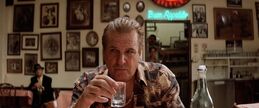Watching "This Killer Is Not So Cold" feels a bit different. Between the two viewings, I have seen "The Lone Killer" directed by Melville and starred by Alan Delong, and I feel that Luc Besson is very interested in this movie. A tribute to the film, and some insights on the temperament of the two films. The killer played by Alain Delon has a melancholy temperament in his loneliness. He is accompanied by a bird in a birdcage, just like the pot of plants Leon brought with him at that moment. Leon looks rougher, has a beard, sharp murderous moves, and more emotionally exposed. Although he is an uncle, he has more boyish temperament, which makes his image more friendly and makes his tragedy more appealing to the audience. Infectious. Before meeting Matilda, Leon’s life seemed very cool. In this film, Luc Besson, the opening scenes of several characters are taken very beautifully, which will let you quickly understand the characteristics of the characters. For example, Leon, at the beginning, he taught the underworld gangsters, and the audience quickly realized this man: he has great ability and can be ten; he keeps principles and is not bloodthirsty; he acts cautiously and courageously, and then he buys milk immediately. Taking care of the plants, letting his loneliness and the delicate side of emotions appear, the character will be full all at once. It seemed that he lived a simple, stimulating, self-styled life, which was very cool and wonderful. Matilda’s life is very bad, but she has a very cool style, precocious and sensitive, smoking at a young age, and talking adult words with a very adult expression, and she also feels like a cool girl on the street. It seems that these two people already have their own life rules, sufferings, and established patterns.
However, the reality is that it's a cool fart. In the final battle, Leon derives the essence from a sentence to Matilda, "You let me taste the taste of life. I want to be happy. Sleep in bed, have your own roots. You will never be alone again. , Matilda." Regardless of Leon and Matilda, they live a forced life, not the life they want. With amazing adaptability, they strive to move on the established track, but they do not reject turning at the next crossroads. possible. From the viewpoint of survival utilitarianism that "to live is the best", the encounter between the two might be a catastrophe. The mighty Leon could have taken on some controllable and dangerous tasks and continued to be a killer safely. However, even so, it is conceivable that he is only on the road to death with an uncertain fate, and may have walked longer, and the spiritual loneliness and the potential damage caused by it will be longer. As for Matilda, she can only gradually go astray. Perhaps, as she said, one day she will kill her parents by herself. In many cases, the pain of life is often an invisible pain of opportunity cost. You can continue your current life. It may be lonely and boring, but you are paralyzed in a sense of security because of the constant, but time is passing by, because of you. Without choosing another way of living, the quality and thickness of life are lost. The most regrettable thing is that this kind of loss passes unconsciously, just like when you didn’t realize that when you were young, a beautiful young girl looked at you lovingly, and you habitually continued your three-point and one-line life pattern until you became an adult. Knowing the truth, I regretted that I missed a youthful love experience. For Leon, for Matilda, fortunately, they met and they started another way of living; unfortunately, they met and caused the death of one person; and in the end, fortunately, , The dead will die without regrets, and the living will return to the sunny side of life.
A few years later, when I watch "This Killer Is Not So Cold", it is no longer just an action movie, but a movie about life choices. Soon after the beginning of the film, facing Matilda’s question, “Is life always hard, or will I get better when I grow up”, Leon’s answer is, “Always be like this”, which is the same as he is desperate for Matilda. Before the fight, the confession to the girl formed a sharp contrast. The seemingly unchanging, stable and secure life is often not the best, or that it used to make you feel excited, happy, and full of passion, but now it has become routine and becomes a life habit. Maintaining the current state of life is a choice, even if it no longer allows you to maintain the happiness of your previous life, it is "safe" and predictable, just like Leon's accustomed life. However, there are still many people who often encounter that turning point of life choice, intentionally or unintentionally, just like Leon. The moment the little girl knocked on his door in tears and despair was a life unintentionally presented to him. The turning point, and the moment when the door was finally opened, was his intentional choice. I really like the director's handling the moment Leon opens the door. The desperate Matilda seems to see a ray of sunshine in life, and this light also reflects on Leon, illuminating another path in life. "This Killer Isn't Too Cold" tells a somewhat sentimental story that actually tells a very bright attitude towards life. This attitude makes this film not only a tight plot, but also a deeper aftertaste. Perhaps, especially for people of a few years old, this feeling is deeper. Seven years ago, the bad charm of Gary Oldman made me admire. Seven years later, the naive kind and infinite Jean Reynolds. Let me respect, after all, in such a seemingly indifferent society, it feels too warm to see such an uncle who is willing to open a door for a desperate girl.
http://hi.baidu.com/doglovecat/item/9ba5f08e12451357e63d19aa
View more about Léon: The Professional reviews









